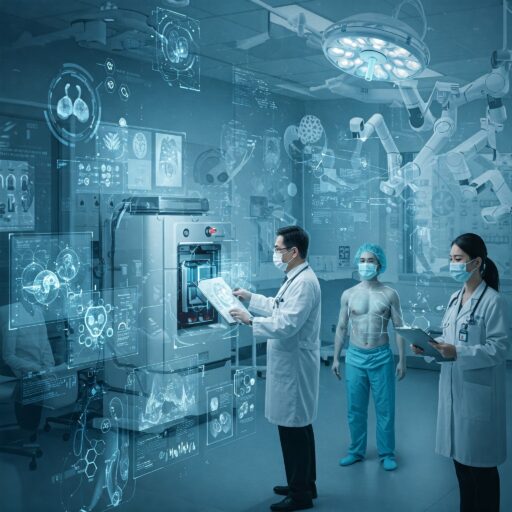AI in Healthcare: Revolutionizing Medical Diagnostics and Treatment
AI in healthcare is transforming the medical field, making diagnostics more accurate and treatments more effective. Artificial intelligence is already assisting doctors in detecting diseases earlier, personalizing treatments, and automating medical processes. From AI-powered radiology scans to predictive analytics for patient care, the integration of AI is revolutionizing medical diagnostics and treatment.
How AI is Changing Medical Diagnostics
AI is making medical diagnostics faster and more precise, improving patient outcomes and reducing human error.
🔹 AI in Radiology & Imaging: AI-powered tools analyze medical images such as X-rays, MRIs, and CT scans with incredible accuracy. Systems like Google’s DeepMind and IBM Watson help detect lung cancer, brain tumors, and even eye diseases.
🔹 AI for Cancer Detection: AI enhances early cancer detection by analyzing biopsy samples and identifying cancerous cells with greater precision than traditional methods.
🔹 AI in Cardiology: AI-driven ECG analysis detects irregular heart rhythms and potential cardiac issues faster than human specialists. This allows for quicker intervention and better patient care.
AI in Healthcare: Personalized Treatments & Drug Discovery
Beyond diagnostics, AI in healthcare plays a major role in treatment and medication development.
🔹 AI-Powered Drug Discovery: AI speeds up drug development by analyzing millions of compounds to predict their effectiveness. This has helped develop treatments for cancer, Alzheimer’s, and even COVID-19.
🔹 Precision Medicine & AI: AI personalizes treatment plans by analyzing a patient’s genetics, medical history, and lifestyle. This ensures better treatment outcomes and minimizes side effects.
🔹 AI in Robotic Surgery: AI-assisted robotic surgical systems, such as the da Vinci Surgical System, allow for minimally invasive procedures, increasing precision and reducing recovery time.
AI in Healthcare Operations & Patient Care
AI is not just transforming medical diagnostics and treatment—it’s also improving overall healthcare operations.
🔹 AI Chatbots & Virtual Assistants: AI-powered assistants help patients book appointments, provide medication reminders, and answer basic medical questions, reducing hospital wait times.
🔹 Predictive Analytics in AI Healthcare: AI analyzes massive amounts of patient data to predict disease outbreaks, hospital readmissions, and patient deterioration. This allows healthcare providers to take proactive measures and improve patient outcomes.
🔹 AI for Mental Health: AI applications detect signs of mental health conditions, such as depression and anxiety, by analyzing speech, facial expressions, and behavioral patterns.
Challenges & Ethical Concerns in AI Healthcare
Despite its benefits, AI in healthcare comes with challenges.
- Data Privacy & Security: AI relies on vast amounts of medical data, requiring strong security measures to comply with regulations like HIPAA and GDPR.
- AI Bias & Fairness: AI models must be trained on diverse datasets to prevent biased results and ensure fair treatment recommendations.
- Regulatory Compliance: AI healthcare tools must meet strict regulatory and legal requirements before they can be widely adopted.
The Future of AI in Healthcare
The impact of AI in healthcare is just beginning. AI will continue to advance, leading to even more accurate medical diagnostics, personalized treatments, and efficient healthcare systems. As AI technology evolves, human expertise and AI-powered insights will work together to improve patient care and save lives.

